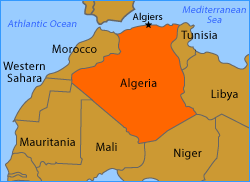Algeria’s population is 99 percent Muslim. As in many nations in North Africa and the Middle East, women have broad political and professional rights, yet Sharia-based laws curtail their rights in the home. Especially in rural areas, social pressures discourage women from working outside the home. For example, women constitute more than half of the country’s university student population, and they can pursue many professional careers, own businesses, and sign contracts. Yet only 20 percent of the workforce is female, and reports of employment discrimination are widespread — and rarely investigated. Approximately a quarter of Algerian judges are women, yet the country’s Family Code subjugates women to their husbands.
Under the Family Code, enacted in 1984, a woman does not have the rights of an adult; she is effectively a minor, and her husband (or another male relative) acts as her legal guardian. The code also permits men to marry up to four wives, consistent with traditional Islamic practice, though in reality very few Algerian marriages (perhaps 5 percent) are polygamous. President Abdelaziz Bouteflika, after winning reelection in 2004, announced a plan to reform the Family Code. He has made good on that promise, but only to a degree: the elimination of some provisions of the code has been approved, but the rules on guardianship and polygamy remain intact.
In women’s rights, Algeria now lags behind neighboring Tunisia and Morocco, the latter having passed substantial changes on women’s rights in the family in early 2004. After King Mohammed VI announced Morocco’s reforms, prominent Algerian lawyer and feminist Nadia Ait-Zai noted, “We’re at the bottom of the class in North Africa. Algeria is now the only country where women need a man’s permission to get married.” Ironically, women played an indirect — albeit unintentional and unforeseeable — role that eventually led to today’s laws; they were key players in the Algerian struggle for independence from France. (Able to hide bombs in their clothing and move more freely than men, women were highly effective rebels.) Algeria won independence in 1962, and since then the government has faced many political, and some military, challenges by Islamists. In 1991-92, Islamists were on the verge of a national electoral victory when the military cancelled elections.
- Previous: Introduction
- Next: Egypt



